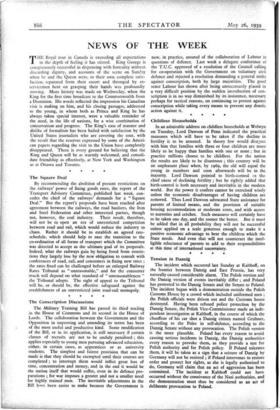The Square Deal By recommending the abolition of present restrictions
on the railways' power of fixing goods rates, the report of the Transport Advisory Committee, published last week, con- cedes the chief of the railways' demands for a " Square Deal." But the report's proposals have been reached after agreement between the railways, the road hauliers, the Iron and Steel Federation and other interested parties, though not, however, the coal industry. Their result, therefore, will not be to open an era of unrestricted competition between road and rail, which would reduce the industry to chaos. Rather it should be to establish an agreed rate- schedule, which should help to ease the transition to the co-ordination of all forms of transport which the Committee was directed to accept as the ultimate goal of its proposals. Indeed, what the railways gain by being freed from restric- tions they largely lose by the new obligation to consult with conferences of road, rail, and consumers in fixing new rates ; the rates fixed can be challenged before an enlarged Railway Rates Tribunal as "unreasonable," and for the consumer much will depend on what standard of " unreasonableness " the Tribunal adopts. The right of appeal to the Tribunal will be, or should be, the effective safeguard against the establishment of an unrestricted joint road-rail monopoly.


























































 Previous page
Previous page